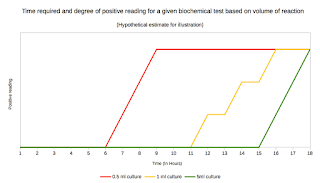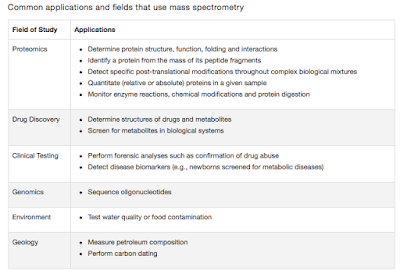Guest Post: What it is to be a part of industry?
Greetings
Over a period of time many people have asked me what it means to have a research career outside academic industry. My answer was "I have no idea". So I requested a friend of mine, Ameya Paleja who works as a Genetic Technologist at ATS GeneTech to write me a piece. He frequently posts in his personal blog space which has a lot of great articles- Coffee Table Science.
--------------------------------------------------------------------------------------------------------------------------
 When Varun asked me to write about “Life in the industry”, it gave me a chance to sit down and think about my work, how I got here and what I feel about it. I do not intend this post to be advice for any of you but this is my story so far.
When Varun asked me to write about “Life in the industry”, it gave me a chance to sit down and think about my work, how I got here and what I feel about it. I do not intend this post to be advice for any of you but this is my story so far.
It is close to six years that I am part of the industrial side of biology, something that I never thought I would do, when I was in college. Back then, (when I was just crossing into my 20s) industry was for dullards who could be happy doing the same thing again and again, every single day, until came Sunday and you took the day off. Creative minds, worked in research, looked at problems and solved them. I was so sure that I was meant for research, that when I graduated, I jumped into my MSc and knew that the next jump would take me to the first year of my PhD.
I was half way through my I year MSc course at the University of Sheffield and with 6 months left for my next leap, I had no idea, what my PhD was going to be about, nor had I identified a lab I would work in. Luckily, the course demanded that we complete project work in one of the labs and I met investigators in popular fields of cancer, bone development, cell signaling, cardiovascular research etc. But nothing excited me as much as genetic tinkering I could do in Molecular Microbiology. I spent the next 4 months, designing primers, doing PCRs, creating bacterial mutants and testing the effects in iron uptake. More importantly, the project taught me what life in research had in store and what I was signing up for.
The reality check came when I had to apply for my PhD but was turned down time and again for the lack of grants, then available for the field. Even today, researchers of the field rue the funding being pumped into cancer research but in 2009-2010, UK had just begun to recover from recession and there were simply not enough jobs around, lesser in academia. (What I realized then was that studying/ working abroad is not as rosy as it sounds. The grass appears greener on the other side. )
When I returned to India, the story was not very different and research funding was scarce. With a study loan to pay, I could not afford to work voluntarily in the lab and even faculty positions were quite a race. A walk in interview that I went for in Raipur had over 50 applicants, some even with PhD’s and post doctoral experience (I think the situation must be even worse now). The only option was the industry.
My applications to the big wigs failed to even get automated replies but the lesser known companies were more than eager to hire. Interestingly, the small and medium scale industry is quite open to accepting people into their fold than people are to them. Probably our definition of ideal life is reduced to of a good pay cheque, company ferrying you up and down everyday and Sodexo coupons that you can spend at restaurants and supermarkets. After about two weeks of applying to these companies, I had two options to choose from; a product specialist position for Molecular Biology range or a Molecular Biology technologist at a genetic diagnosis company. The lab position was alluring than the marketing job and I took it up.
A few months after joining the company, my stereotypes began to haunt me. I was getting comfortable with the work that I was doing in the lab and now I seemed like a dullard who liked doing the same thing day after day. I started to become unsure if I would wake up the next day and still feel like reporting to work? There seemed like only one way to break free from this trap that I had set up for myself and that did not involve quitting my job. I walked up to the company’s director and asked for more work that would not be repetitive but also help lab in some way.
Putting a great amount of faith in me, I was given the task of adding new tests to the lab’s directory of services. (This would probably not have happened had I not taken the first step) I started expanding the number of common mutations that we were testing for or even adding new tests altogether, that were relevant to the local population. Genetics, being a relatively new area of medicine in India, is still growing and awareness about genetic disorders has just started to become more common. Apart from my regular work, I spent a fair amount of time, reading publications, ordering primers, standardizing tests for our lab and validating them. R & D in the industry has a commercial focus, so you are likely to spend time and effort on something that has commercial value sooner or later.
As our base of tests grew, we started getting requests for tests that were usually outsourced to countries like the US, Austria, etc. Not only do these tests cost quite a bit (a few lakhs to begin with), the turnaround time is usually in months. We took it up as another challenge and delivered test results to patients, using similar technology, with quicker turn around and at a fraction of the original cost. Apart from our regular array of tests, we now regularly receive custom requests for identifying / screening of genetic disorders and we are helping patients and their families. Additionally, we have also been able to publish scientific papers which have not only added to our credibility but might also help other labs/ researchers in India who are looking to achieve something similar. Come to think of it, if you really want to solve a problem, academia is not the only place to do so.
Over the past year, I have been involved in putting in place a quality management system for the work that we do in our laboratory. The quality system ensures that the results given by the laboratory follow the processes that are internationally acceptable and practiced and gives results that accurate, reproducible and traceable. Our effort were recognized by an external assessing body, National Accreditation Board for testing and calibration Laboratories (NABL) who have granted us accreditation as per norms of 15189:2012 and puts us at par with medical testing laboratories around the world. Pharma or Biotech industries follow other norms for maintaining the quality of their work and this work can be highly rewarding for those who like to maintain meticulous records of the work they have done.
About three years ago, I also collaborated with a friend to start our blog, Coffee Table Science. The basic idea was to make a portal where people from all walks of life could visit and read about scientific developments and also about science in general. We don’t do, what is gravity and why do leaves look green kind of posts but cover recent findings and post interviews with researchers from different parts of the world. The blog lets me read more about science and also connect with other people, like Varun, who are doing their own bit for sharing science and science communication in general.
Overall, I would say that I am quite pleased working in the industry and with what I have done so far. Probably working in a larger biotech company would not have let me dwell into so many things that I have done in the past six years.
..... Ameya Paleja





Comments
Post a Comment